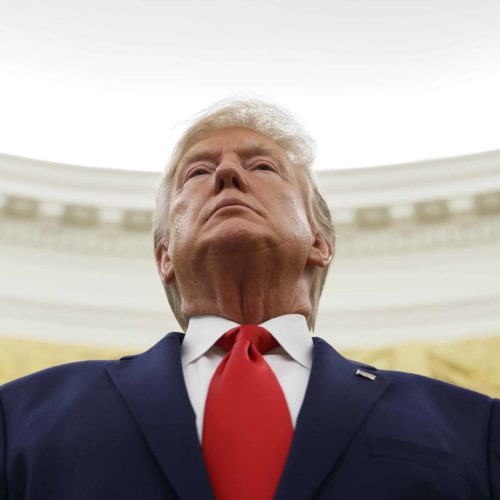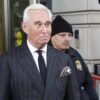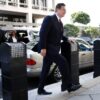Introduction
Alex Finley (@alexzfinley) is the pen name of a former journalist and an officer of the CIA from 2003 to 2009, who is now writing analyses of Robert Mueller’s investigation. She is the author of two satires about the CIA.
As head of the Gambino crime family, John Gotti earned the moniker “Teflon Don” because for a long time the charges against him “just wouldn’t stick.” It turned out that was because Gotti and his thugs intimidated witnesses and jurors in his various trials.
But in 1992, a jury — one that was sequestered and kept anonymous — heard secret recordings investigators had made. In them, Gotti threatened violence and retaliation and made it clear that those who flouted him would pay a heavy price. He pledged to fight the investigators “tooth and nail to the end,” and his spokesman claimed he was the victim of a class war. “He didn’t go to Harvard. He didn’t go to Yale. This is the way these men talk,” the attorney said. “They are snippets of much larger conversations that were deliberately taken out of context … Those isolated phrases don’t mean what the prosecutors say they mean. They are not evidence of criminality.”
In the end, the recordings led the jury to convict Gotti and send him to prison for life. But current events are uncomfortably reminding us of how such mafioso leaders have acted and how they defended themselves.
President Donald Trump sits atop what looks more and more like a shady organization. His people have been sent to prison for campaign finance deals, convicted for bank fraud and tax evasion, charged with lying to authorities and intimidating witnesses, and more.
This has all come into even sharper relief over the last few weeks, as a torrent of allegations has rained down on the Oval Office asserting that Trump has, in effect, been using the entire U.S. government in what look like shakedowns meant for his personal gain.
Since a complaint from a whistleblower from the CIA — the agency where I used to work — first became public in September, we’ve heard about dirty money from foreign sources meant to influence U.S. policy. We’ve seen reports that Trump asked Secretary of State Rex Tillerson to do a favor for Trump’s lawyer by getting the Department of Justice to drop a criminal case against a Turkish gold trader. And we’ve seen enter on scene two characters straight out of Little Odessa central casting, with connections to a Ukrainian oligarch the FBI believes is in cahoots with the Russian mafia and who have been working with Trump’s personal lawyer. Trump — and lately his congressional supporters — have used threats and intimidation, attempting to stymie investigators and scare off witnesses, and made others complicit in his actions.
In short, he has tried to transform the U.S. government into his own mafia “family.”
Dangling some window insurance
The current scandal kicked into high gear when Trump made Volodymyr Zelenskyy an offer he couldn’t refuse. In a July 25 phone call, a partial transcript of which the White House released, the Ukrainian president stroked the boss’s ego before asking for more weapons for use against Russian military in Ukraine’s east.
“I would like you to do us a favor though,” Trump responded. The favor? To fabricate dirt on Trump’s political opponent, Joe Biden, and his son and also to pursue an elaborate theory about Ukrainian hacking that Trump evidently hopes will undermine the U.S. intelligence community’s conclusion that Russia conducted a widespread pre-election influence operation against the United States to help him out. Several federal officials have since characterized the “favor” of investigating alleged links between figures in Ukraine and U.S. politics as a quid-pro-quo, including Trump’s acting chief of staff (who later pulled back on his comments). Trump has denied this, but his overall remarks had the ring of a mob boss saying, “It’s a beautiful country you got there. It would be a shame if something happened to it.”
Trump roped his own diplomats into the intimidation scheme, too. After pulling back the U.S. ambassador to Ukraine, Marie Yovanovitch — who said in a deposition earlier this month that her apparent offense was resisting the subordination of U.S. national security interests in Ukraine to “private interests” — Trump sent Ambassador William Taylor as his top diplomat in Kyiv. Yet, as Taylor testified this week before Congress, two other diplomats, U.S. Ambassador to the European Union Gordon Sondland and Ukraine Special Envoy Kurt Volker, had created a separate, informal channel of diplomacy with Ukrainian officials, working in coordination with Trump’s attorney, Rudy Giuliani, who had political favors in mind.
Taylor testified about his growing horror as he realized that Trump — using Giuliani’s cabal as his messengers — was dangling U.S. support as a reward for Zelenskyy’s participation in Trump’s personal political scheme. At first, Taylor thought only an Oval Office meeting with Trump was being used as leverage. He soon realized the full military aid — weapons and money — was on the line. Taylor explained that Sondland told him, “‘everything’ was dependent” on Zelenskyy publicly announcing an investigation into Biden and the 2016 election. “[Sondland] said that President Trump wanted President Zelenskyy ‘in a public box’ by making a public statement about ordering such investigations.” Sondland’s attorney has since said he doesn’t recall making those remarks.
Zelenskyy, of course, desperately needed the security aid. He is, after all, fighting a war against Russia. As Trump figuratively dangled him by his ankles off a balcony, Zelenskyy apparently — and after early reluctance — agreed to announce the investigations during an interview with CNN, although in the end he never did.
Presidential tweet or horse’s head?
Trump has also tried to turn the screws on his informers. He bluntly said he wanted to find out the identity of the whistleblower and the whistleblower’s sources, calling them “spies” and alluding to a firing squad punishment. He attempted to squash any witness testimony to Congress, calling the impeachment proceedings a “kangaroo court” and asserting officials under the executive branch would not be allowed to testify. Many of those witnesses were prepared to testify voluntarily; Trump’s attempts to block their testimony led Congress to issue them subpoenas.
Trump’s friends have engaged in similar behavior. Roger Stone, one of Trump’s off-the-books advisers during the campaign, is on trial for allegedly lying to Congress about his conversations with WikiLeaks and for witness intimidation. According to a federal indictment, Stone suggested in a text message to radio personality Randy Credico, who had himself been called to testify before Congress during the Robert Mueller probe, that he pull a “Frank Pentangeli,” a reference to a character in the film “The Godfather: Part II” who lies in his testimony to a congressional committee. That is, Stone was allegedly asking Credico to lie to Congress. When Credico made it clear he planned to cooperate instead, the indictment says Stone texted him, “You are a rat. A stoolie. You backstab your friends-run your mouth my lawyers are dying Rip you to shreds.”
He then threatened to take out Credico’s therapy dog and later texted, “Prepare to die [expletive].”
Trump’s many consiglieri
Meanwhile, Giuliani has been working many angles for Trump. He ran the unofficial diplomatic channel to the Ukrainian government while seeking advice at one point from former Trump campaign manager Paul Manafort, currently serving a prison sentence for bank fraud and tax evasion linked to his work in that very same country of Ukraine. In Trumpland, Manafort is a good guy who didn’t flip, unlike the boss’s former lawyer, Michael Cohen, who did. Trump doesn’t like flippers. “It almost ought to be illegal,” he said at one point. “They flip on whoever the next highest one is or as high as you can go.” Trump called Cohen a “Rat” for pleading guilty to crimes that implicated Trump. Manafort, on the other hand, “refused ‘to break,’” Trump tweeted when Manafort rejected cooperating with the feds. “Such respect for a brave man!”

Trump and Giuliani have worked hard to rope others into their project. Secretary of State Mike Pompeo and Attorney General William Barr each traveled to Italy, and Barr went to the United Kingdom. There, they met with high-level intelligence officials in an apparent effort to help reset the Russia interference narrative and even — in the case of Italy — asked for reports on what U.S. intelligence officers had done. This must feel awkward in allied capitals, since these security services almost certainly provided some of the intelligence that led U.S. investigators to conclude Russia had interfered in the election, an offense for which Trump now wants to assign blame elsewhere.
All in the family
Guiliani also worked with Lev Parnas and Igor Fruman, two Soviet-born businessmen with connections in Ukraine who were arrested in Virginia on October 10 as they attempted to board an international flight with one-way tickets to Vienna, shortly after lunching with Giuliani at Trump’s Washington hotel. Federal prosecutors have indicted the pair for funneling Russian money — of uncertain origins — into a pro-Trump super PAC.

Parnas had also worked with Victoria Toensing and Joseph diGenova, two lawyers who praise Trump regularly on TV and who tried to be part of his defense team. The two hired Parnas as a translator for one of their clients, Dmytro Firtash, a Ukrainian oligarch who is fighting extradition to the United States. According to U.S. prosecutors, Firtash is an “upper-echelon [associate] of Russian organized crime.”
While they officially work for Firtash, the lawyer duo have helped Trump’s case. A Ukrainian official, whose credibility has been assailed in both Ukraine and Washington, provided a deposition to help Firtash, claiming charges against Firtash were politically motivated by none other than Joe Biden.
It all comes back to the Russian model
Gary Kasparov, the chess champion-turned-Putin-critic, once said, “Russia is a mafia state today, and Putin is its top godfather.” He easily controls all the levers of government and many of those in the private sector, too. If Putin asks a private oligarch to launch a troll factory to interfere in Western elections, as occurred in 2016, the oligarch says yes or risks losing his access (and thus his wealth, power, and status).
Interestingly, some of the actions Trump has been taking this year — pushing the blame-the-Ukrainians for election meddling theme, and singlehandedly forcing the withdrawal of U.S. troops from northern Syria — comport with Moscow’s views. And like Putin, Trump thinks he rightfully should have full control over this enterprise we call the United States. His strange public confessions — the release of a summary of his call with the Ukrainian president and his open calls for China and Ukraine to dig up dirt on a political opponent — are the marks of a man who thinks the jury (in this case, the U.S. Senate) is firmly in his pocket.
But unlike a mafia Don, who exercises authority over every aspect of his business and co-opts everyday individuals into all his schemes, the president of the United States faces some checks and balances. We now know that many individuals were aware of Trump’s actions and felt uncomfortable with them. Some reported the actions to lawyers. Most kept detailed, contemporaneous notes. And some, like the original whistleblower who set the impeachment inquiry in motion, filed complaints through protected channels.
Trump and his supporters have called these attempts to hold him accountable a “coup” and “a lynching,” among other hyperbolic descriptions.
Nevertheless, more whistleblowers have filed complaints against the president they say has tainted foreign policy for personal benefit, and more civil servants continue to give testimony about his wrongdoing. Trump may be trying to make his family function his preferred way, but it seems the dam has burst and more people inside the government, who have a different view of its purpose and its principles, are ready to fight to make sure he doesn’t get his way in the future.
Read more in National Security
The Mueller Report
Putin won the battle, but the outcome of the war is still uncertain
The Kremlin’s election triumph has been undermined by Mueller’s disclosures and by Washington’s renewed strategic wariness.
The Mueller Report
Like any good spy story, the Barr account of the Mueller report contains mysteries
Collusion, cut-outs and covert ops; the dangerous ambiguities on which intelligence agencies thrive.




Join the conversation
Show Comments